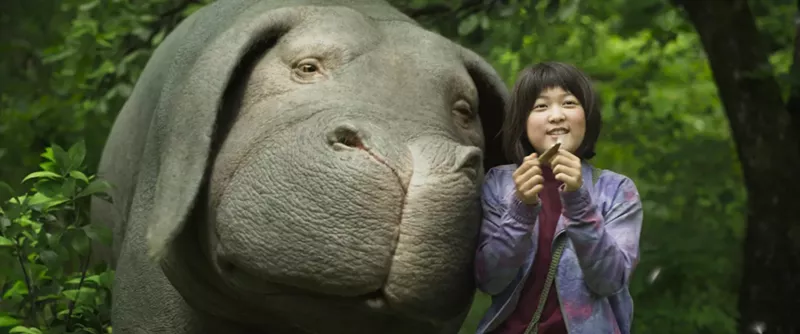In the run-up to this year’s Cannes Film Festival, Bong Joon-ho’s Okja was one of the most mysterious titles in the Official Competition lineup. Then, after people had seen it, Okja turned out to be … one of the most mysterious titles in the Official Competition lineup. Now that it's in some theaters and on Netflix, the mystery remains. What is it, exactly? A children’s movie? An action flick? A subtle political allegory? A flamboyant, dystopian satire? A vegetarian manifesto?
It is a little bit (and maybe even a lot) of all those things — and, for a while, at least, it works marvelously. The satire is initially foregrounded, as the Mirando Corporation, a giant multinational run by the garishly narcissistic Lucy Mirando (Tilda Swinton), unveils a super-pig that has been discovered in Chile. In the dazzling musical-number corporate video that kicks off the film, Lucy tells her employees that these pigs will leave a minimal environmental footprint, require less feed, and result in a revolution in the livestock industry. She announces a contest in which farmers around the world will be given a piglet each and compete to raise the finest super-pig. How will the winner be determined? There will be a number of factors, but most important will be that the pig, as Lucy tells us, “needs to taste fucking good.” (So maybe it’s not a kids’ movie?)
The story kicks into gear some years later, as Mija (Ahn Seo-hyun), an orphaned girl living in the mountains of South Korea whose beloved super-pig, Okja, is her constant companion, resists the efforts of Mirando employees to take away her porcine pal. (The time has come for the super-pigs to be judged at Mirando headquarters in New York.) Also seeking to disrupt the corporation’s efforts is the Animal Liberation Front, an environmental resistance group led by the well-dressed and exceedingly polite Jay, beautifully played by Paul Dano as the most sensitive, beta-male revolutionary leader in the history of cinema. As Mija and these oddball guerrillas battle the megacorporation in an effort to save Okja (not to mention all the other super-pigs), the picture veers from adorable action fable to vegetarian call to arms to throw-it-all-against-the-wall-and-see-what-sticks comedic free-for-all.
Anyone who’s familiar with Bong’s filmmaking should know, however, that there are deeper, more serious ideas at work here. (Think back to The Host, his monster movie–slash–family drama–cum–anti-imperialist screed; recall Snowpiercer’s literalization of class conflict onboard a sci-fi mega-train.) The director even goes so far as to re-create the iconic war room photo of the White House during the Bin Laden raid, complete with Swinton’s Mirando covering her mouth, à la Hillary Clinton, and her lieutenant, Giancarlo Esposito, wearing Barack Obama’s jacket and mimicking his slouch. At first, I read this as a playful, throwaway sight gag, but the more I think about it, the more it reveals.
The film seems to be about how the United States and its corporate allies project power around the world. Certainly, the fact that Lucy presents herself as the less mentally ill (but no less ruthlessly opportunistic) alternative to her extraordinarily cruel sister (also played by Swinton), who was previously in charge, seems significant — a nod to the fact that even under kinder, gentler administrations, the United States continues pretty much all of its imperialist policies. The sisters constantly acknowledge that their father was indeed psychotic, and that they are nothing like him — an echo of modern American politicians’ attempts to distance themselves from the country’s past behavior. Throughout the film, the bad guys’ most effective weapon is their skill at rebranding themselves.
There’s a lot to chew on here, but in the end I wish Okja simply worked better as a movie. Its first half is breathtaking, with Bong balancing offbeat characterizations and savage satire with slick, go-for-broke action scenes. One early truck chase in particular is unforgettable. (The later ones, not so much.) Ultimately, the director can’t quite keep all these balls in the air. Some performances descend into irritating shtick, especially that of Jake Gyllenhaal as a Mirando-sponsored TV personality, acting like he lost a bet with Swinton. Meanwhile, the political overtones get muddled, and the human story becomes more cloying and artificial. As its many fragmented ideas threaten to fall apart, Okja ladles on the sentiment — with diminishing returns.

Audio By Carbonatix
[
{
"name": "GPT - Billboard - Slot Inline - Content - Labeled - No Desktop",
"component": "23668565",
"insertPoint": "2",
"requiredCountToDisplay": "2"
},{
"name": "STN Player - Float - Mobile Only ",
"component": "23853568",
"insertPoint": "2",
"requiredCountToDisplay": "2"
},{
"name": "Editor Picks",
"component": "17242653",
"insertPoint": "4",
"requiredCountToDisplay": "1"
},{
"name": "Inline Links",
"component": "18838239",
"insertPoint": "8th",
"startingPoint": 8,
"requiredCountToDisplay": "7",
"maxInsertions": 25
},{
"name": "GPT - 2x Rectangles Desktop, Tower on Mobile - Labeled",
"component": "24956856",
"insertPoint": "8th",
"startingPoint": 8,
"requiredCountToDisplay": "7",
"maxInsertions": 25
},{
"name": "Inline Links",
"component": "18838239",
"insertPoint": "8th",
"startingPoint": 12,
"requiredCountToDisplay": "11",
"maxInsertions": 25
},{
"name": "GPT - Leaderboard to Tower - Slot Auto-select - Labeled",
"component": "17676724",
"insertPoint": "8th",
"startingPoint": 12,
"requiredCountToDisplay": "11",
"maxInsertions": 25
}
]







